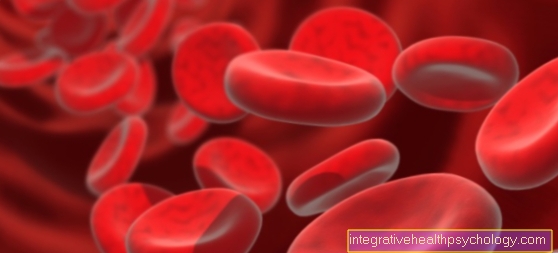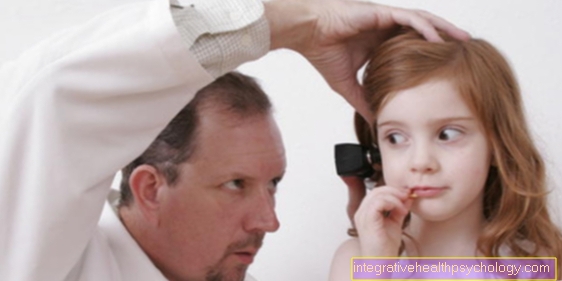Dizziness in the head
introduction
A new one Dizziness in the head is a common symptom. About to complain to the family doctor every 10th patient over dizziness. A Dizziness in the head can next organic causescan also be attributed to psychological factors and illnesses.

causes
Dizziness is a common symptom that can have a number of very different causes.
The most common are low blood pressure, alcohol consumption and benign paroxysmal positional dizziness. The benign (benign) paroxysmal (seizure-like) positional vertigo is characterized by vertigo attacks that occur especially after changing positions. This disease is caused by detached structures of the balance organ, which send incorrect information to the brain due to their changed position.
Another possible diagnosis is migraine, which statistically occurs very frequently, but can cause very different symptoms.
Diseases whose cause lies in the inner ear, such as Menière's disease or inflammation of the balance organ (labyrinthitis) or of the nerve supplying it (vestibular neuritis), can also cause serious attacks of dizziness. In Menière's disease, the affected person experiences paroxysmal vertigo, the cause of which is a disruption in the re-absorption of fluid in the inner ear.
Very rarely, pathological processes in the central nervous system, i.e. the cerebrum or brain stem, can also cause dizziness. Depending on the symptoms, it may be necessary to rule out such so-called preventable and dangerous processes.
For more information, read on: Causes of vertigo.
Dizziness in the head from stress
Mental stress and persistent stress play a major role in causing dizziness in the head.
Dizziness can occur as a result of mental illnesses such as depression or anxiety disorders. In many cases, everyday situations can be very stressful for some people and are associated with a greatly increased level of stress. Especially in people with an anxiety disorder, dizziness is often accompanied by a racing heart, tremors, shortness of breath and a great feeling of fear.
Dizziness, which is triggered by a lot of stress in professional life, is often accompanied by a feeling of being overwhelmed and exhausted.
In general, dizziness in the head is aggravated under stress and strain, even if it is due to an organic cause. It must therefore be remembered that the increased occurrence of dizziness in the head in stressful situations is not a sufficient criterion for a purely psychological cause. In order to counteract the stress, relaxing exercises or the incorporation and maintenance of rest periods in everyday life help.
Read more on the topic:
- Dizziness from stress
Dizziness in the head from diseases of the eyes
Diseases in the area of the organ of vision can be accompanied by a new dizziness in the head. Disturbed or incorrect processing of the impressions gained during the visual process can lead to confusion in the brain, which manifests itself in the form of dizziness. Above all, visual defects that are not properly compensated for, wearing new glasses or a new squint as a result of paralysis of the eye muscles can lead to perception errors and dizziness. Many patients who need glasses because of a visual defect are often noticed by early symptoms such as dizziness or impaired concentration.
You might also be interested in these topics:
- Dizziness and blurred vision
- Dizziness and eyes.
Menopause
During the menopause a fundamental change in the hormonal level takes place in the female body.
This results in a wide variety of symptoms that are not only gynecological in nature, but can also affect the circulation, temperature sensation and the psyche. The exact symptoms differ from woman to woman. The change in the circulation can also affect blood pressure. In turn, low blood pressure can cause dizziness. The blood vessels are also affected by the hormonal change. Statistically speaking, menopausal women have an increased risk of vascular wall disease. Such illnesses also favor the development of vertigo attacks.
Head dizziness and pregnancy
Head dizziness is very common during pregnancy. Pregnancy is a challenge for the female body, as the entire circulatory system changes to supply the unborn child. Seizures of dizziness are particularly common in the first trimester of pregnancy. The dizziness in the head can be triggered by either too low or too high blood pressure or a derailment of the blood sugar level. Even when getting up or sitting down, there is often a feeling of discomfort, which can be accompanied by drowsiness and dizziness.
Another cause of dizziness in the head during pregnancy is decreased blood flow back to the heart due to the growing uterus. Due to the constantly growing uterus, the inferior vena cava can be pressed when lying down, which reduces the return of blood to the heart. In addition to dizziness and drowsiness, this can also lead to acute shortness of breath and loss of consciousness. In order to counteract this, the supine position should be avoided as far as possible and lying on the left side should be preferred. Adequate hydration, not too jerky movements and sufficient breaks should also be ensured in order to prevent dizziness during pregnancy. Anemia, which occurs frequently during pregnancy, can also be accompanied by dizziness in the head and malaise.
Read more on the topic:
- Dizziness and pregnancy
- Dizziness in the morning
Dizziness in the head when lying down
The cause of the vertigo in the head that occurs when lying down is in most cases benign positional vertigo. Spinning vertigo develops, which can be triggered in particular by sudden changes in the position of the head and body and is often associated with nausea and vomiting. The cause of vertigo attacks are small stones in the ear that irritate the sensory cells and thus trigger the dizziness in the head. Above all, changes in the body position such as jerky turning of the head or lying down from a sitting position cause the small stones in the ear to send off false stimuli that cannot be properly perceived by the brain and thus trigger a feeling of dizziness in the head.
Increased alcohol consumption can also cause dizziness, which is increased when lying down. The patients feel dizzy due to a disturbed coordination of the body position and what the eyes perceive, since the alcohol leads to a temporary inhibition of some sensory cells (see: Dizziness with alcohol).
Muscular tension, for example caused by a wrong lying position, can also be the cause of dizziness in the head. The dizziness develops as a result of incorrect signals being transmitted from the muscles to the brain.
When lying down, disorders of the cardiovascular system (blood pressure too high or too low), palpitations or shortness of breath can also be accompanied by a feeling of dizziness.
Also read:
- Dizziness when lying down
Dizziness in the head when lying down
The trigger for dizziness when lying down can often be the benign positional dizziness. This form of vertigo is a spell-like vertigo, triggered by a disturbance in the organ of equilibrium. The dizziness in the head can be remedied through targeted positioning training.
Circulatory system problems, such as incorrectly controlled blood pressure or blood sugar levels, can also cause dizziness in the head when lying down. Sets blood pressure that is too low (Hypotension) is the cause of the dizziness that occurs, then it usually improves after a certain time in a lying position. Dizziness is often caused by the heart being unable to supply enough blood to the brain. In a lying position, the blood from the legs can quickly flow back to the heart and thus more blood is available to supply the brain.
More information can be found here:
- Dizziness when lying down
Can it also be a brain tumor?
A tumor in the skull that originates from the brain cells, for example, can trigger a variety of symptoms. This also includes symptoms of dizziness. In fact, dizziness is an extremely rare symptom of a brain tumor, as the tumor then has to disrupt the very structures that are responsible for the sense of balance.
For dizziness that is triggered by a brain tumor, only localizations on the brain stem or on the inner ear or on the organ of equilibrium are considered. In addition, brain tumors are generally very rare. Therefore, in most cases, it is extremely unlikely that the cause of dizziness is a brain tumor.
Concomitant symptoms
People who have dizziness in their head may have different symptoms. On the one hand, the dizziness can appear suddenly and in a fit-like manner. In this case, the patients often report attacks of dizziness, which are usually expressed as vertigo that begins suddenly and quickly disappears.
In contrast, the dizziness can also be persistent. Dizziness in the head is often associated with many other symptoms. In addition to a general malaise and a feeling of drowsiness, it can lead to unsteady gait and orientation difficulties. Those affected feel insecure on their feet and can sway. Nausea, vomiting, tremors, and profuse sweating can also occur in severe dizziness attacks. Patients with persistent dizziness often complain of headache, tiredness and a feeling of weakness. Furthermore, there may be a feeling of pressure in the head. Visual disturbances can also be accompanied by dizziness in the head.
Read more about the topic here:
- Dizziness and lightheadedness.
fatigue
fatigue can frame him from Dizziness in the head occur. In this context it is often referred to as a kind Malaise and weakness described, both during a Vertigo attack as well as during the periods of vertigo can manifest. A general one develops Feeling tired and needing more sleep, because above all a long-lasting, always subliminal dizziness in the head can tug very much at the physical substance.
One through stress related dizziness can lead to a fatigue that can last for weeks and lead to severe restrictions in everyday life.
Visual disturbances
The term "visual disturbances" can describe very different complaints. These include, for example, flickering in front of the eyes, double vision or complete loss of the field of vision, which the person concerned perceives as black or gray spots.
When combined with dizziness, it usually points to a cause in the brain. From a statistical point of view, the most common is migraine. Since the entire cerebral cortex can be affected by a migraine attack, a wide variety of symptoms and sensory disorders can occur. Much less common causes are lesions in the brain or the central nervous system, for example due to bleeding or tumors. In the case of newly occurring visual disturbances that cannot be reliably assigned to another cause, these pathological processes should therefore be excluded.
Read more on this topic:
- Dizziness and blurred vision
- Dizziness through the eye
a headache
Headaches can also occur as a further symptom in addition to dizziness in the head. Headaches often occur due to exhaustion or due to tension in the muscular structures, especially with long-lasting dizziness.
Dizziness caused by muscular problems often leads to tension headaches that are rather dull and localized over the entire head. Headaches combined with dizziness can also be signs of a migraine. Nausea, vomiting and sensitivity to light can also occur.
If dizziness occurs for the first time in connection with severe, sudden headache, this complex of symptoms can indicate a serious illness such as cerebral haemorrhage. Long-lasting, dull or severe headaches that are accompanied by visual disturbances and dizziness in the head can be a sign of a space-occupying process in the brain.
Read more on the topic:
- Dizziness and headache
Neck pain
Neck pain that occurs together with dizziness should be examined by a doctor.
Particular speed is required if the symptoms appear within a short period of time or have worsened significantly, or if certain accompanying complaints occur. These include impaired consciousness, restricted mobility, numbness and fever. These symptoms can indicate meningitis. In the case of neck pain caused by a previous injury to the cervical spine, dizziness should be taken particularly seriously and clarified as soon as possible, as the injury may also damage structures in the head or the central nervous system.
Feeling of pressure in the head
A feeling of dizziness can also be accompanied by a feeling of pressure. The term pressure feeling can mean different symptoms. For example, pressure in the head can appear in the ear, be felt throughout the head, or take the form of a headache. If these symptoms occur with dizziness, it may be due to a common cause, such as motion sickness or Meniere's disease, there are often other accompanying symptoms as well.
Also read:
- Dizziness and pressure in the head
What to do if you have dizziness in the head?
The therapeutic approach for dizziness in the head depends on the cause. To briefly interrupt the dizziness in the head, you can use drugs (Antivertiginosa) administer. These are particularly useful for people suffering from motion sickness or migraines, as they not only relieve dizziness but also the nausea that often occurs.
Dizziness caused by high blood pressure or disorders in the blood sugar balance can also be treated with medication.
In benign positional vertigo, the doctor performs a positioning maneuver so that the small stones in the ear that cause the vertigo are loosened.
Dizziness in the head caused by tension in the muscles can be treated with the help of massages and physiotherapy exercises. Through these exercises, the muscles are loosened and relaxed so that correct signals can be sent to the brain again.
If dizziness occurs in connection with eye discomfort, it is often sufficient to wear glasses to compensate for existing visual defects in order to eliminate the dizziness in the long term.
Psychiatric treatment should be considered if mental illnesses such as depression or anxiety disorders are present.
To prevent dizziness in the head, it is important to avoid stress. You should also make sure you get enough sleep, check your blood pressure and ensure that you are drinking enough fluids. If vertigo attacks occur chronically and at regular intervals, you should be prepared for them in everyday life. In this case, you should not drive a car or work with dangerous machines as far as possible.
Read more on the topic:
- Therapy for dizziness
diagnosis
To diagnose dizziness, a detailed medical history must first be taken. This means that the doctor asks the person concerned about the time, duration, frequency, exact symptoms and accompanying symptoms of the vertigo.
Blood pressure should also be measured routinely, as low blood pressure can also cause dizziness. Since dizziness is a generally common symptom that can occur in numerous different diseases, further diagnostics are based on the results of the anamnesis. In some cases, a diagnosis can even be made based on the anamnesis. One then speaks of a clinical diagnosis.
If this is not the case, the dizziness occurs frequently and the affected person restricts their everyday life, a cause should be sought. For this purpose, a blood test can be carried out and certain positioning maneuvers can be carried out. An MRI (magnetic resonance imaging) of the head is rarely required to rule out causes in the brain.
When do you need an MRI of the head?
Since dizziness is such a non-specific and general symptom, it may be necessary to carry out further diagnostics. This is the case when the dizziness has reappeared and no possible causes for the vertigo attacks could be shown in the anamnesis and the previous examinations and diagnostic measures.
An MRI should also be done if the dizziness has suddenly appeared, worsened rapidly, and is accompanied by other warning signals. These warning signals include, for example, impaired consciousness and language, numbness, paralysis, headache, fever or nausea or vomiting. In these cases, an emergency MRI (magnetic resonance imaging) or, if it takes too long, CT (computed tomography) is usually done.
- MRI of the head
Duration and forecast
The duration of the vertigo attacks varies depending on the cause.
While positional vertigo usually improves after one or a few minutes, an attack in Menière's disease usually lasts for 10 minutes or even hours. Migraines cause dizziness lasting several hours or even a day. Dizziness due to inflammation in the inner ear or its nerves only disappears after this inflammatory reaction has subsided, i.e. usually after one or more days.
The prognosis for dizziness attacks also varies depending on the cause. Some illnesses are characterized by recurring seizures or relapses, such as Menière's disease, migraines or benign paroxysmal positional vertigo. Other diseases such as vestibular neuritis can be treated in such a way that the inflammatory reaction subsides and dizziness no longer occurs.

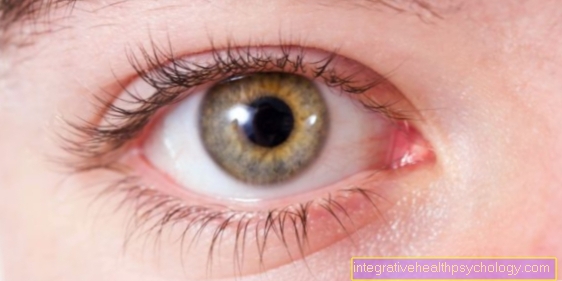
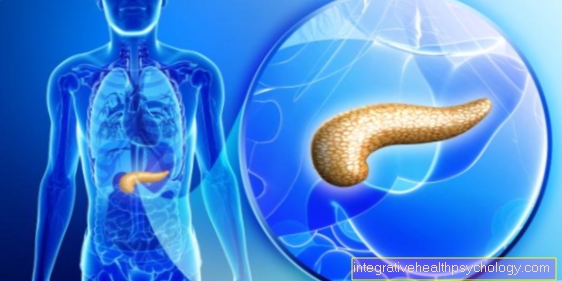
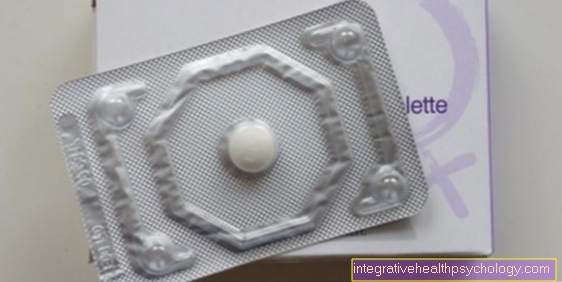






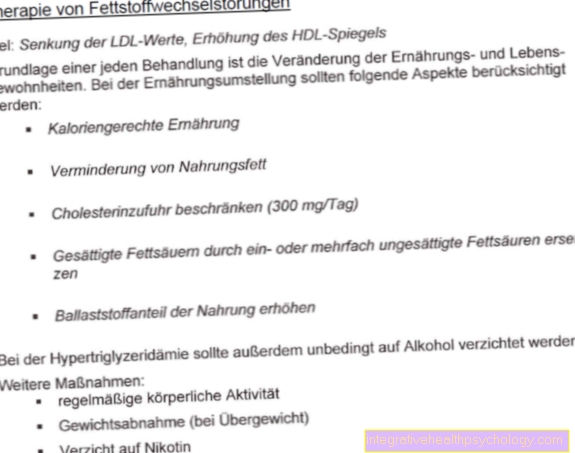





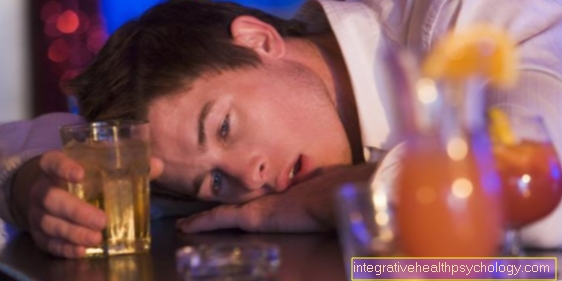
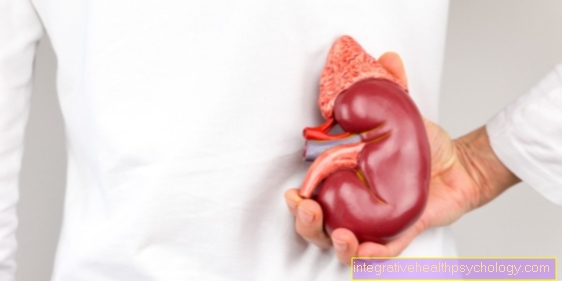

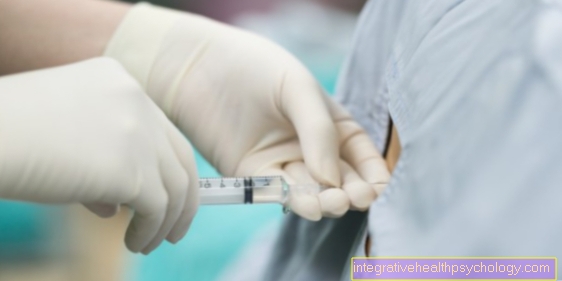

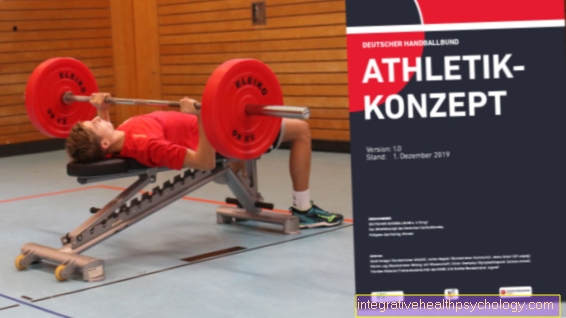

.jpg)



